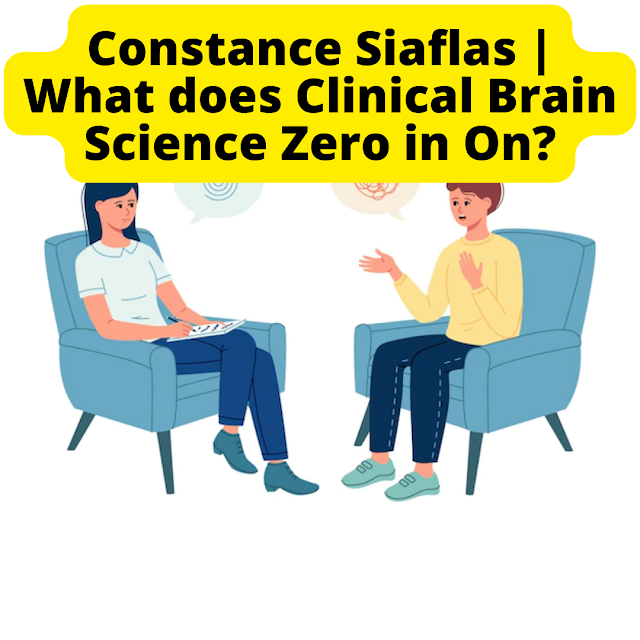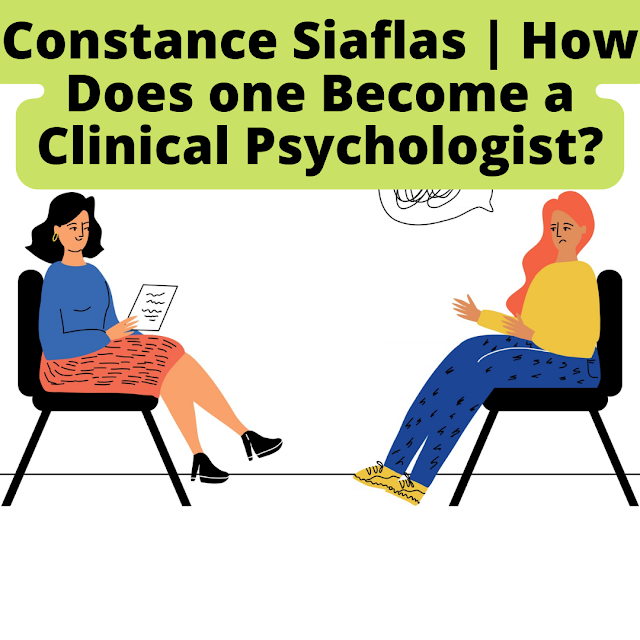Constance Siaflas | What does Clinical Brain Science Zero in On?
What does Clinical Brain Science Zero in On?
Clinical Psychology offers mental administration to individuals of any age and foundation. Strategies and procedures might differ from one practice to another.
Constance Siaflas says In any case, clinical brain research centers around surveying clients' emotional wellness through mental appraisal and testing and giving fitting mediations.
Notwithstanding these center exercises, clinical clinicians now and again direct examination and go about as consultants4. Here is an outline of the fundamental errands of a clinical clinician:
Assess. In re-establishing emotional wellness, clinical analysts follow the very movement that doctors continue in reestablishing actual wellbeing. You should initially figure out what the issue is and what is causing it.
In this manner, the clinical analyst surveys the client to analyze the emotional wellness issue. This occurs in more ways than one.
During a demonstrative meeting, the clinical clinician poses inquiries that offer the client the chance to discuss themselves. These inquiries look at what the client is thinking, feeling, and doing and how the previous influences the present.
A conduct evaluation permits a clinical clinician to notice and assess a client's way of behaving. This evaluation can uncover an example of conduct that demonstrates the presence of mental problems and psychological maladjustment.
Clinical Psychology and Psychiatry?
The fields of psychology and psychiatry are often confused because they both deal with mental and emotional disorders. But the training and methods used in these disciplines vary greatly.
Psychologists treat clients whose mental illness may be the result of previous emotional trauma or other negative influences. Treatments usually involve problem-solving with talk therapy and other non-medical techniques.
Psychologists are not health professionals but have doctorates in psychology (PsyD) or philosophy (Ph.D.).
When a patient's disorder is attributed to an imbalance in brain chemistry or some other physiological cause, a psychiatrist is consulted.
Psychiatrists typically have a bachelor's degree in psychology and are therefore familiar with many of the cognitive-behavioral therapies used by clinical psychologists.
They are doctors who specialize in the medical treatment of mental illness.
How Does one Become a Clinical Psychologist?
Constance Siaflas said Becoming a licensed clinical psychologist requires both a solid academic background and practical experience in the field of psychology. Students interested in this type of career must complete an accredited clinical psychology program and complete clinical training before earning a degree.
1. Earn your clinical psychology degree.
Complete a Bachelor of Science or Bachelor of Psychology degree from an accredited institution. As a rule, you must achieve a grade of "C" or better in each of these four courses:
statistics
Abnormal psychology or psychopathology
Experimental psychology/research methods in psychology
Physiological Psychology, Learning/Memory, Cognitive Psychology or Sensory/Perceptual
2. Take and pass the GRE Psychology test.
Passing this standardized test is an admissions requirement for many graduate schools in psychology. Some schools only accept applicants whose score is in the 80th percentile or better.
3. Do a Ph.D.
Earn a Ph.D. or Ph.D. in clinical psychology through an APA-accredited program such as that offered by the California School of Professional Psychology (CSPP) at Alliant International University.
The course load of these programs may overlap with common themes such as data analysis and cultural diversity. Although clinical psychology graduate programs on offer vary from school to school, you have the flexibility to choose a major that suits your interests.
Health, Family/Child and Couple, and Forensic Psychology are just some of the possible areas of interest. While the PsyD program emphasizes clinical practice and the Ph.D. program emphasizes research, both programs include dissertations and internships.
4. Complete an Internship.
According to Constance Siaflas, You must have documented hours of clinical fieldwork to become a licensed psychologist. California requires a minimum of 3,000 hours of supervised work experience.
5. Pass national and state psychology exams.
You must pass the Psychology Professional Practice Examination (EPPP). In California, you must also pass the California Psychology Law and Ethics Examination (CPLEE).
6. Purchase your license.
After passing the psychology exams and your clinical psychology program, you can finally apply for a state license. This license shows that you can legally earn a salary as a practicing clinical psychologist.
Your fingerprints must be taken as part of the license application process. California also requires you to show that you have taken courses in specific areas such as child abuse and domestic violence.






Comments
Post a Comment